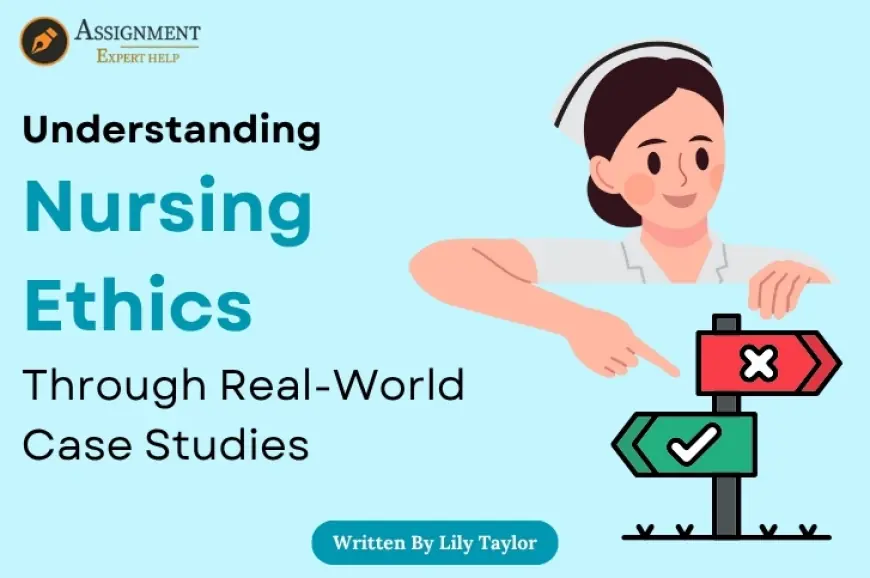Understanding Nursing Ethics Through Real-World Case Studies
Master ethical nursing standards in the UK. Our blog offers key concepts and case studies to help students make informed decisions.

Nursing is poised to play a pivotal role in every scenario, no longer just in providing care. Ethics enters the picture here. Understanding nursing ethics is essential to becoming a professional nursing college student in the UK; it isn't always simply a necessary educational subject. Students can learn how to make difficult choices even by adhering to their expert norms and ideals by using real-world case studies, which offer a powerful way of examining how ethical thoughts are utilised in actual-world situations.
This blog post will define nursing ethics, discuss important concepts that every student nurse within the UK ought to understand and offer nursing case study help through real-world examples to help clarify these ideas.
Nursing Ethics: What Is It?
The ethical standards that direct nurses in their work are known as nursing ethics. These guidelines help nurses in making ethical decisions in hard, often emotionally taxing circumstances. Ethics is based on knowing what's truthful, courteous, and compassionate, specifically when the solutions are not uncomplicated. It's now not most effective to follow the guidelines.
The Nursing and Midwifery Council (NMC) Code, which establishes expert standards of practice and conduct for nurses, midwives, and nursing associates, is intently related to nursing ethics in the United Kingdom. As a student or registered nurse, you need to make sure that each choice you're making and the movement you make comply with these criteria.
Important Ethical Guidelines All Nursing Students Should Understand
Before delving into case studies, it's critical to comprehend the primary nursing ethical principles:
-
Autonomy: Even if you disagree with a patient's selection, you ought to respect their freedom to make their own decisions.
-
Beneficence: Acting in the patient's best interest.
-
Non-maleficence: keeping patients safe.
-
Justice: Granting everybody identical access to remedy and treating them equally.
-
Maintaining confidentiality: Maintaining the patient's confidentiality.
-
Responsibility: Accepting the duty for your deeds.
Now, let's use case research to apply those thoughts to a few actual occasions.
Top 4 Case Studies Based On Real-World Situations
-
Case Study 1: Honouring Patient Self-Sufficiency
Situation:
Chemotherapy is no longer something that a 72-year-old female with advanced breast cancer wants to undergo. Her own family disputes this, claiming she is not questioning properly.
Moral Concern:
Independence as opposed to own family preferences.
Discussion:
As a nursing pupil, you may revel in struggle. You want to assist the distraught family, on the one hand. However, the patient is entitled to make her alternatives, even though those choices consist of discontinuing the remedy. The NMC Code promotes patient autonomy, which means that a patient's dreams need to be honoured if she is mentally equipped.
Conclusion:
It's crucial to assist the patient's family emotionally while simultaneously advocating on their behalf. Ethical behaviour in this case consists of honouring the patient's preference, offering comfort, and supporting the circle of relatives in accepting it.
-
Case Study 2: Handling Privacy Concerns
Situation:
While on a placement in a popular practitioner's office, you hear a classmate loudly discussing a patient's case inside the waiting room.
Moral Concern:
Violation of confidentiality.
Discussion:
A blatant violation of confidentiality takes place whilst a student discusses patient facts in public, even if they have no malicious motive. The NMC Code makes it very clear that patient records must be kept personal and provided handiest when required and appropriate.
Conclusion:
You have to have the confidence to speak up as a student. You can discuss your concerns with your supervisor or the student in a non-public setting; it does not need to be combative. Part of fostering agreement within the NHS is safeguarding the patient's privacy.
-
Case Study 3: Refusing Treatment by Using Patients
Situation:
Due to their religious convictions, a diabetic patient refuses to take insulin. You're involved in that their fitness may decline rapidly.
Moral Concern:
Striking a balance between the obligation of care (beneficence) and appreciation for autonomy.
Discussion:
This is a tough situation. In addition to striving to avoid damage (beneficence), you have a moral responsibility to appreciate the patient's ideals (autonomy). This necessitates effective communication, together with explicitly outlining the risks, offering options if they may be available, and, if essential, enlisting the help of a multidisciplinary team (which includes physicians, chaplains, and cultural mediators).
Conclusion:
Cultural focus is critical. Pay interest, teach yourself, and take some time to strike a balance between upholding moral principles and encouraging fine health outcomes.
-
Case Study 4: Disparities within the Provision of Care
Situation:
You study that sufferers who are not able to communicate in English are regularly excluded from ward talks, which results in a lack of comprehension regarding their treatment plan.
Moral Concern:
Fairness and parity in information and care access.
Discussion:
Care ought never to be inferior to nice because of language limitations. The NMC Code places a strong emphasis on justice and respect. Patients are not receiving equitable care if they're unable to take part absolutely due to linguistic or cultural barriers.
Conclusion:
Promote the usage of verbal exchange aids and recommend the availability of decoding services. One of your obligations as a nurse is to advocate for the rights of those who are weak or underprivileged.
How Students Should Handle Ethical Conundrums
It is straightforward to feel overpowered while confronted with an ethical predicament during exercise or placement. Here's a quick, simple technique to help you assume absolutely:
-
Determine the Ethical Problem: Which precept or idea is under assault?
-
Collect Data: Recognise the huge photo. If important, ask questions.
-
Examine your options: What should you do? What are the repercussions?
-
Ask for Advice: Talk to a mentor, supervisor, or clinical educator.
-
Reflect: Consider your expertise and how it pertains to the NMC Code.
The Significance of Case Studies in Nursing Education
Reading about ethics is one factor; however, witnessing its application in real conditions is quite different. Case studies help you in:
-
Gain skills in vital questioning
-
Practice placing the concept into practice in realistic settings.
-
Be emotionally ready for a tough choice.
-
Develop patient-targeted techniques and empathy.
Reflective writing, sports based on moral case studies, position-playing, and simulation laboratories are common in UK nursing curricula. Take advantage of those probabilities; they may help you get geared up for the difficulties you will encounter in the actual world.
Reflection Is The Key
Having the right solution isn't always the intention of ethics. There is regularly no "proper" solution. Reflective exercise is vital due to this. Following every encounter, recollect the subsequent:
-
What happened?
-
How did I experience it?
-
What laboured and what failed to?
-
In the future, how would I do it differently?
Not the simplest is this introspective method useful; it's far from predicted. It's a prerequisite for the future NMC revalidation and an aspect of your professional development.
Wrapping It Up
Nursing ethics is a part of your everyday work, not just a topic. Ethical requirements will direct your activities and mildew you into the nurse you are, no matter whether you're coping with confidentiality, consent, fairness, or tough decisions concerning end-of-life care.
One of the finest approaches to getting equipped as a nursing student in the UK is to examine real-life case studies. You'll experience greater readiness and assurance while dealing with difficulties on the ward or inside the community, the extra you practise ethical thinking now.
Therefore, keep this in mind the next time you have to make a difficult preference in class or on placement: act in a way that is courteous, truthful, kind, and compliant with the NMC Code. Being kind, being concerned, and being professional are more crucial components of nursing ethics than being perfect, and if you're struggling to express these ideas in assignments, seeking academic writing help can make a big difference.
What's Your Reaction?
 Like
0
Like
0
 Dislike
0
Dislike
0
 Love
0
Love
0
 Funny
0
Funny
0
 Angry
0
Angry
0
 Sad
0
Sad
0
 Wow
0
Wow
0

















































